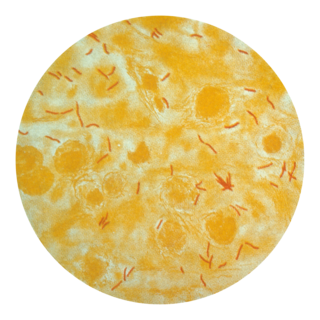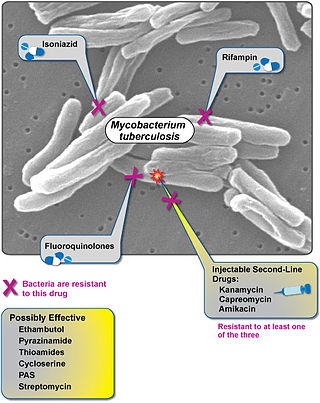Related Research Articles

Tuberculosis (TB) is an infectious disease usually caused by Mycobacterium tuberculosis (MTB) bacteria. Tuberculosis generally affects the lungs, but it can also affect other parts of the body. Most infections show no symptoms, in which case it is known as latent tuberculosis. Around 10% of latent infections progress to active disease which, if left untreated, kill about half of those affected. Typical symptoms of active TB are chronic cough with blood-containing mucus, fever, night sweats, and weight loss. It was historically referred to as consumption due to the weight loss associated with the disease. Infection of other organs can cause a wide range of symptoms.

Mycobacterium bovis is a slow-growing aerobic bacterium and the causative agent of tuberculosis in cattle. It is related to Mycobacterium tuberculosis, the bacterium which causes tuberculosis in humans. M. bovis can jump the species barrier and cause tuberculosis-like infection in humans and other mammals.

Tuberculosis is diagnosed by finding Mycobacterium tuberculosis bacteria in a clinical specimen taken from the patient. While other investigations may strongly suggest tuberculosis as the diagnosis, they cannot confirm it.
TB Alliance is a not-for-profit product development partnership (PDP) dedicated to the discovery and development of new, faster-acting and affordable tuberculosis (TB) medicines. Since its inception in 2000, TB Alliance has worked to grow the field of available treatments for TB and now manages the largest pipeline of new TB drugs in history. It was founded in Cape Town, South Africa, and has since expanded. It is headquartered in New York City and has a regional office in Pretoria.
IDDS may refer to:

Extensively drug-resistant tuberculosis (XDR-TB) is a form of tuberculosis caused by bacteria that are resistant to some of the most effective anti-TB drugs. XDR-TB strains have arisen after the mismanagement of individuals with multidrug-resistant TB (MDR-TB).
The National Tuberculosis Elimination Programme (NTEP), earlier known as the Revised National Tuberculosis Control Programme (RNTCP), is the Public Health initiative of the Government of India that organizes its anti-Tuberculosis efforts. It functions as a flagship component of the National Health Mission (NHM) and provides technical and managerial leadership to anti-tuberculosis activities in the country. As per the National Strategic Plan 2017–25, the program has a vision of achieving a "TB free India",with a strategies under the broad themes of "Prevent, Detect,Treat and Build pillars for universal coverage and social protection". The program provides, various free of cost, quality tuberculosis diagnosis and treatment services across the country through the government health system.

Tuberculosis is a serious public health problem in China. China has the world's third largest cases of tuberculosis, but progress in tuberculosis control was slow during the 1990s. Detection of tuberculosis had stagnated at around 30% of the estimated total of new cases, and multidrug-resistant tuberculosis was a major problem. These signs of inadequate tuberculosis control can be linked to a malfunctioning health system. The spread of severe acute respiratory syndrome (SARS) in 2003, brought to light substantial weaknesses in the country's public health system. After the government realized the impact that the SARS outbreak had on the country, they increased leadership in their health department. After the SARS epidemic was brought under control, the government increased its commitment and leadership to tackle public health problems and, among other efforts, increased public health funding, revised laws that concerned the control of infectious diseases, implemented the world's largest internet-based disease reporting system to improve transparency, reach and speed, and started a program to rebuild local public health facilities and national infrastructure.
Health in Afghanistan remains poor but steadily improving. It has been negatively affected by the nation's environmental issues and the decades of war since 1978. The Ministry of Public Health oversees all matters concerning the health of the country's residents.

Health in Vietnam encompasses general and specific concerns to the region, its history, and various socioeconomic status, such as dealing with malnutrition, effects of Agent Orange as well as psychological issues from the Vietnam War, tropical diseases, and other issues such as underdeveloped healthcare systems or inadequate ratio of healthcare or social workers to patients.

FIND is a global health non-profit based in Geneva, Switzerland. FIND functions as a product development partnership, engaging in active collaboration with over 150 partners to facilitate the development, evaluation, and implementation of diagnostic tests for poverty-related diseases. The organisation's Geneva headquarters are in Campus Biotech. Country offices are located in New Delhi, India; Cape Town, South Africa; and Hanoi, Viet Nam.
The Xpert MTB/RIF is a cartridge-based nucleic acid amplification test (NAAT) for simultaneous rapid tuberculosis diagnosis and rapid antibiotic sensitivity test. It is an automated diagnostic test that can identify Mycobacterium tuberculosis (MTB) DNA and resistance to rifampicin (RIF). It was co-developed by the laboratory of Professor David Alland at the University of Medicine and Dentistry of New Jersey (UMDNJ), Cepheid Inc. and Foundation for Innovative New Diagnostics, with additional financial support from the US National Institutes of Health (NIH).

One Health Trust, formerly the Center for Disease Dynamics, Economics & Policy (CDDEP), is a public health research organization with headquarters in Washington, D.C., and Bangalore, India.

Sir Alimuddin Zumla,, FRCP, FRCPath, FRSB is a British-Zambian professor of infectious diseases and international health at University College London Medical School. He specialises in infectious and tropical diseases, clinical immunology, and internal medicine, with a special interest in HIV/AIDS, respiratory infections, and diseases of poverty. He is known for his leadership of infectious/tropical diseases research and capacity development activities. He was awarded a Knighthood in the 2017 Queens Birthday Honours list for services to public health and protection from infectious disease. In 2012, he was awarded Zambia's highest civilian honour, the Order of the Grand Commander of Distinguished services - First Division. In 2022, for the fifth consecutive year, Zumla was recognised by Clarivate Analytics, Web of Science as one of the world's top 1% most cited researchers. In 2021 Sir Zumla was elected as Fellow of The World Academy of Sciences.
Sir Stewart Thomas Cole is a British/French microbiologist. He has been the director general of the Pasteur Institute since January 2018.

Cepheid is an American molecular diagnostics company that is a wholly owned subsidiary of Danaher Corporation. Its systems automate traditional nucleic acid tests. The tests can be used to identify and analyze pathogens and genetic disorders. Cepheid sells clinical tests for healthcare-associated infections, infectious diseases, sexual health, oncology and genetics.
The Nigeria Centre for Disease Control (NCDC) is the national public health institute for Nigeria. It is a federal government agency under the Federal Ministry of Health (Nigeria), with its headquarters in Abuja, Federal Capital Territory.

The Africa Centres for Disease Control and Prevention is a public health agency of the African Union to support the public health initiatives of member states and strengthen the capacity of their health institutions to deal with disease threats. The Africa CDC ideas was proposed by the government of Ethiopia in 2013 during a TB/HIV special summit in Abuja, Nigeria. From 2013 to 2016, the modalities and statue of Africa CDC were developed and the specialized agency was officially launched in January 2017.

Ibrahim Ibrahim Abubakar is a British-Nigerian epidemiologist who is Professor in Infectious Disease Epidemiology at University College London and Dean of the UCL Faculty of Population Health Sciences.
Truenat is a chip-based, point-of-care, rapid molecular test for diagnosis of infectious diseases. The technology is based on the Taqman RTPCR chemistry which can be performed on the portable, battery operated Truelab Real Time micro PCR platform. Truenat is developed and manufactured by Goa-based Molbio Diagnostics Private Limited.
References
- ↑ "Infectious Disease Detection and Surveillance | IDDS | USAID". iddsproject.org. Retrieved 2023-04-19.
- ↑ (CSIS), Center for Strategic and International Studies (2019). "Can Digital Health Help Stop the Next Epidemic?". Center for Strategic and International Studies (CSIS).
{{cite journal}}: Cite journal requires|journal=(help) - ↑ ICF. "ICF Selected for $120 Million USAID Infectious Disease Detection and Surveillance Project". www.prnewswire.com. Retrieved 2023-04-19.
- ↑ "Liberia Project Dashboard". www.liberiaprojects.org. Retrieved 2023-04-19.
- ↑ "Senior Country Coordinator (Infectious Disease Detection and Surveillance) | CORE Group: Working Together in Health for Mothers, Children and Communities" . Retrieved 2023-04-19.
- ↑ Truenat training modules overview.
- ↑ Reisdorf, Erik (2023-03-20). "Malawi: Uncovering Opportunities to Improve TB Detection". LeaderNet. Retrieved 2023-04-19.
- ↑ "IDDS Project Fact Sheet" (PDF). iddsproject.0rg.